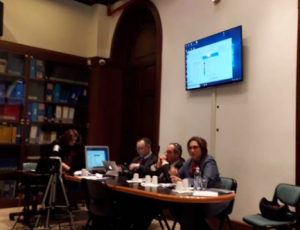EDUCATION A Shared Vision for Jewish Studies in Italian Community Schools
The Progetto Curricolo Nazionale Studi Ebraici (Project for a National Curriculum in Jewish studies) promoted by the Union of Italian Jewish Communities (UCEI) has reached its final stages after five years of intense work with the participation of the four Italian Jewish schools (Trieste, Turin, Milan and Rome) and their managers, teachers, and educators.
Four programs of Jewish studies have been formulated, differentiated by each school, but with the same methodology and scientific approach.
The collective effort was the topic of a series of meetings that took place in the local communities with the participation of the scientific director Shmuel Wygoda, a professor at the Hebrew University in Jerusalem who has been cooperating with the UCEI.
This endeavor represents a unique initiative in the diaspora communities, commented Professor Wygoda in his closing speech in Rome. “No Jewish reality in Europe, he said, has worked on a similar project for its educational commitments”.
“For the Italian Jewish world the challenge is also to internationalize and to de-provincialize. In this sense the results of the projects are tangible, with many exchanges in progress. Paradoxically, there are few comparative experiences at a national level. This project aims to indicate a path,” highlighted rav Roberto Della Rocca, director of the UCEI Education and Culture.
“Today we arrive at the final moment of the journey. There is a great deal of work behind it. It has been an enriching experience for everyone; for the students and for the teachers who have been trained in this direction. The tools we created are not rigid, but they can be adopted for different realities” emphasized the member of the UCEI board for School, Education and Youth, Livia Ottolenghi.
On the same wavelength was Saul Meghnagi, president of the UCEI Education committee, who said, “Now it is essential to capitalize on what has already been done and build a path that looks to the future, through a network of teachers and educators”. Special appreciation was expressed to Professor Wygoda, who thanks to his skills both in terms of Jewish text proficiency and pedagogy “has done alone what would normally require two people”.
“Many hours of work and effort have been invested. All have worked in the best way to ensure the continuity of Italian Judaism”, explained Wygoda on the occasion. Then he added, “By visiting the schools I realized that it is impossible to put together the various realities from a sociological, educational, and religious point of view. The work was therefore particularly meaningful and I am grateful for the determination of the UCEI in supporting us “.
Odelia Liberanome, the project coordinator, emphasized that the experience proved to be useful for all the professionals involved, and it made possible the reinforcement of a “Jewish vision” which can potentially be adapted to other educational realities.

